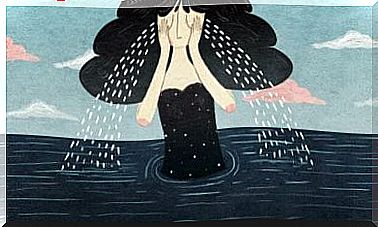The Disasters You Imagine May Never Happen

Mental disasters are simply the result of an imaginative mind. Humans have the amazing ability to fantasize, which aids in adaptation and has other benefits as well. For example, it leads to the creation of ingenious ideas that have solved many problems, and also to the creation of inventions, stories, works of art and so on.
The mind is a space in which ideas, thoughts and evaluations continue to flow incessantly, whether they are about ourselves, other people, or work in general. Sometimes these ideas correspond to reality, but other times they are distorted. It is as if we have put on glasses with dirty or foggy lenses. Sometimes the way we interpret external information is shaped by our beliefs, values, knowledge and personal experiences.
This propensity to fantasize is in every human being and it almost always has damaging emotional and behavioral consequences.
A head full of disasters
A common example of these distortions of reality appears in anxiety disorders. People suffer from anticipatory anxiety because in their minds there is evidence of a possible future threat. So their emotions are disrupted, interrupting their flow of thoughts – which begin to grind uncontrollably – and paralyze their creativity.

People who suffer from anxiety disorders have learned that the world is dangerous and that is why they should be concerned. They must pay close attention to whether the threats arise, because they can lead to disaster. They think that worrying magically prevents something terrible from happening, as if a thought could separate us from actual facts.
Thoughts are nothing more than ideas, mental images, words, internal dialogue. They are not reality. Worrying about something that will definitely not happen is absurd and takes a lot of energy.
This bleak way of looking at the future is called catastrophizing. It’s a cognitive error in the way you interpret the world. In these moments, we believe more in ideas, fears, and insecurities than in the information we get from our senses.
Magical worrying
I’m sure you’re on to something right now – we all are more or less. But maybe you know how to control it, so it won’t lead to much anxiety. This is a healthy kind of worry because it pushes you towards finding solutions to a problem and helps you face it in the most logical way.
If your worries are controlling you, you must stop your wandering mind and command it to go back to the present, the only thing that is really real.
If you worry excessively, your perception tends to be quite distorted. It’s normal; you believe an impending catastrophe is coming and you will not survive… how can you not be nervous? But in reality, there is nothing looming in the distance. As we’ve said before, you have to stop fantasizing and realize that the catastrophes you expect only exist in your head. They are not real.
You worry so much that something terrible will happen and then eventually it doesn’t happen, but the worst part is you think it won’t happen because you’re worried. This way you reinforce your worrying behavior, so the next time a problem or setback occurs, you will do it again. Even if you lie awake about it, you think it makes you safe! Worrying is magical, it saves us from our problems!

Think before you catastrophize
No, worrying isn’t magic and it won’t help you solve your problems. That’s absurd. Think about it: how can a thought solve an earthly problem? You confront problems by taking action. And you can’t solve every problem that arises anyway, because there are certain factors that you just can’t control.
If you are tired of worrying, even if you think it will help, it would be good to start thinking in a more realistic way. Wipe your glasses and fill your brain with more scientific thoughts.
Let’s think about that… You think something is very likely to happen to you (you get sick, your plane crashes, your partner will leave you, etc.), but you don’t have enough evidence to back it up. So why do you think it’s likely to happen? Grab a pen and paper and try to calculate the probability of actually happening what you fear and think about it for a while.
If you eventually find evidence and continue to think it’s still very likely, the worst that could happen in that situation wouldn’t be so serious. Write down a list of actual disasters that have happened in the world and then think about whether yours is as serious as you think. Even if the worst possible scenario happens, you can deal with it.
Finally, you have to be practical. Every day, pay attention to your worries, the ones that are unlikely to happen and are not very serious, and think about whether you have control over them or not. If you don’t have that, stop wasting your precious time. If you have, come up with solutions using your imagination.









